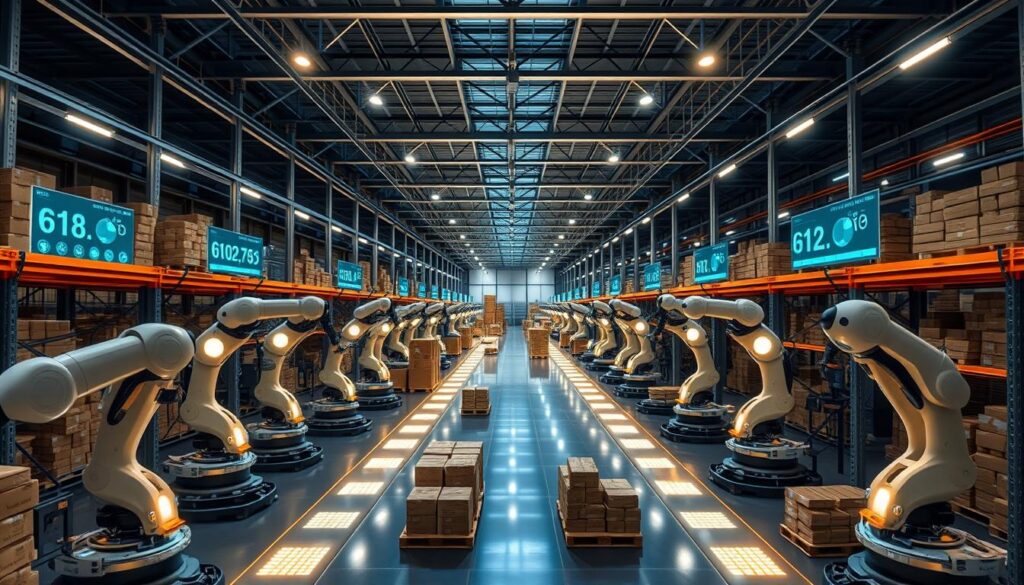In this era of technology, artificial intelligence (AI) in operations management stands out. It’s essential for companies to use AI to be efficient and innovative today. An impressive 94% of business leaders believe AI is key to success in the future. AI has many uses in operations, like managing logistics, quality, and supply chains.
Using artificial intelligence means a big change in how companies operate. AI-driven analytics show ways to improve that weren’t clear before. IBM saved USD 160 million in supply chain costs with AI. Many companies see AI as essential for efficient work, reducing downtime, and doing tasks better than humans, like visual inspections.
Key Takeaways
- AI proves to be a crucial competitive asset with 94% of business leaders anticipating its pivotal role in imminent success.
- Optimizations in forecasting and inventory management via AI-power lead to significant reductions in lost sales and forecasting errors.
- Companies leveraging AI for supply chain solutions, like IBM, illustrate tangible financial gains and perfect order fulfillment.
- The integration of AI in visual inspections boosts defect identification accuracy, surpassing conventional human-inspected benchmarks.
- Through AI-augmented customer service, businesses are achieving substantial operational reductions and projected financial savings.
- Automation of managerial reporting and administrative tasks showcases a dramatic cut in processing time, courtesy of RPA powered by AI.
- AI’s implementation in practical uses such as predictive maintenance optimizes equipment performance and minimizes unexpected operational halts.
Embracing AI for Enhancing Operations Management
In this fast-paced world, using AI for operational efficiency is essential. Operations management is changing thanks to AI. AI solutions for operational enhancement are making businesses faster and smarter. They help in handling tasks quickly and predicting future hurdles.
AI is great at taking over routine jobs like entering data and managing finances. This frees up people to focus on more important things. It helps avoid mistakes and makes operations smoother and more reliable.
AI is changing how companies analyze data too. It can quickly sift through lots of data and find patterns missed by humans. For supply chains, AI improves predictions and lowers costs, boosting efficiency.
When it comes to security, AI is vital. It can predict and stop cyber threats before they hit. This keeps businesses safe and running smoothly.
AI is also key in preventing equipment failures. It predicts problems before they happen, reducing repair time and costs. This helps keep everything running without interruption.
The benefits of AI in operation management are clear in many areas. It improves customer service and makes office tasks easier. By using AI, companies can stay ahead in the competitive market.
Revolutionizing Process Efficiencies with AI Solutions
AI has changed how companies improve their processes. It makes workflows better and starts a new stage of operational smarts. By using AI, all kinds of businesses are doing better and working more efficiently.
Intelligent Process Automation (IPA) leverages AI to surpass traditional automation limits, enhancing scalability and efficiency.
AI helps businesses deal with complex, unstructured data. It uses machine learning, natural language processing (NLP), and computer vision. These AI tools turn difficult data into clear insights. This is especially important in manufacturing, where handling data right leads to success.
- Scalability: AI systems adjust to changing workloads, keeping operations smooth no matter how busy it gets.
- Agility: Real-time data helps make quick decisions, which is key to staying ahead in the market.
- Efficiency: AI finds and fixes problems, helping companies keep up high-quality operations.
AI also cuts costs and makes things more reliable when fused with robotic automation and predictive maintenance. Predictive analytics foresee equipment issues. This reduces surprises and extends the life of machines.
| AI Integration in Automation | Impact |
|---|---|
| Predictive Maintenance | Reduces maintenance costs by 15% and decreases unplanned downtime by 30-40% |
| AI-driven Quality Control | Defect rates reduced by up to 50% |
| AI-enhanced scheduling systems | Boosts production efficiency by up to 20% |
In summary, using AI makes work processes smoother and encourages ongoing progress and creativity. Manufacturers using AI see better use of resources and big leaps in efficiency. This confirms AI’s key role in today’s operational tactics.

Maximizing Asset Utilization through Predictive Maintenance
Using AI-driven operational optimization improves industrial operations significantly. It applies artificial intelligence to smooth operations. This lets industries use predictive maintenance to foresee equipment issues and boost their assets’ longevity and performance.
Real-time data is key in monitoring and maintaining equipment efficiently. With AI, predictive maintenance processes sensor data to flag the right time for maintenance. This approach cuts downtime and boosts productivity, leading to major cost savings and better equipment reliability.
Real-time Equipment Health Monitoring
Artificial intelligence uses supervised and unsupervised learning to analyze sensor data and maintenance histories. This helps spot anomalies that could signal equipment failure. By doing so, maintenance can be planned ahead to ensure smooth, ongoing operations.
Extending Asset Lifespan with AI-Augmented Analysis
AI improves the creation of failure analysis models. These models not only increase study efficiency but also enable maintenance to be scheduled proactively. Such planning prolongs machinery life and reduces costs, making operations more sustainable.
Top companies have noted major benefits. For example, some have cut production downtime by 30% using AI in predictive maintenance. This shows notable operational reliability and significant economic benefits.
| Benefits of Predictive Maintenance | % Increase / Decrease |
|---|---|
| Overall Equipment Effectiveness | Up to 5% |
| Average Downtime Reduction | Up to 30% |
| Capital Expenditures in U.S. Oil & Gas | Decrease of 55% |
| Operational Cost Reduction | Significant |
In summary, embedding artificial intelligence for streamlined operations into industry practices enhances equipment health and function. It also places businesses in a strong position to tackle the complexities of modern industries with more agility and insight.
Optimize Operations with Artificial Intelligence
AI is changing the game by making operations more efficient across many industries. It does this through streamlined operations and better supply chain management with AI. These technologies let businesses understand things better and make quick, informed decisions. This can really change how businesses work.
Streamlining Supply Chain Management
AI improves supply chain management by predicting the future and looking at data right away. It helps companies get ready for market changes and make their logistics better. Platforms like IBM show how AI can save money and make things run smoother. For example, advanced managed solutions use AI to automate important tasks. This makes sure supply networks are always at their best.
Automating Inventory Control for Operational Excellence
Using AI to automate inventory control makes managing stock better. It keeps the right amount of stock through accurate demand forecasts. This avoids having too much or too little, which makes operations more efficient. AI helps companies make smarter choices, something hard to do with just manual work. This leads to great improvements in how companies operate.

AI also cuts down the need for manual work in logistics and makes sorting faster and more accurate. It looks at past data to help manage stock better, avoiding too much or too little. Innovations in AI help businesses perform better and stay ahead in a competitive market.
AI brings big changes to IT operations management, from predicting what will happen to making automatic decisions in logistics. These upgrades create a lasting advantage, ensure operations run well, and help supply chains keep getting better.
Leveraging AI-Powered Analytics for Informed Decision-Making
The use of AI in improving operations has really changed how companies analyze data and make choices. By using artificial intelligence, organizations get ahead by planning better and managing risks well.
Companies use AI in business operations to go through lots of data. They find insights that lead to smarter choices. This not only makes things more efficient but also makes customers happier by personalizing their experiences. It’s a big win for how well companies do and how satisfied customers are.
Enhancing Business Strategy with Data-Driven Insights
AI analytics are key in making business strategies better. By using predictive analytics, businesses can predict market changes. Companies like Amazon use AI to suggest products, improving customer shopping and business performance.
Refining Risk Assessment with Intelligent Forecasting
AI helps businesses get ready for future challenges. It uses past data and predictions to spot risks. This makes operations smoother by perfecting investment choices and adjusting prices.
In healthcare, predictive analytics help with patient care and saving costs. These tools analyze data for better treatments. It shows how AI improves operations in different areas.
With more businesses using AI, focusing on its ethics and how it fits into current systems is important. Making sure AI is used rightly will keep things open and fair.
Using AI in business makes operations smoother and depends on strong, data-based insights for excellence.
AI in Customer Experience: From Engagement to Retention
Businesses are changing how they connect with their customers thanks to artificial intelligence for streamlined operations. With the help of AI-powered chatbots and detailed analytics, companies can greatly improve the customer experience. This new method helps keep customers by offering personalized and efficient service.
For example, Liberty London uses AI to understand what customers want and adjusts how they talk to them. This boosts both efficiency and customer happiness. Tools like Zendesk WFM use AI to make sure customer service teams are always ready and effective.
Moreover, about 65% of leaders in customer service believe AI is key for standing out from competitors. The Zendesk Customer Experience Trends Report 2024 shows that AI is vital for modern, agile customer service strategies.
The advantages of using AI in customer service are clear:
- It cuts costs by automating simple tasks and reducing the need for many workers.
- AI tools give customers personalized attention in real-time, making interactions more meaningful.
- Customizing customer experiences with AI helps keep customers coming back.
As AI technology keeps getting better, its ability to make big improvements in customer service grows. By using AI for enhanced customer experience, companies are improving how they operate. They are also setting new benchmarks in how satisfied and loyal customers are.
Conclusion
Artificial intelligence is changing operations management in big ways. Industries are experiencing huge efficiency boosts and tackling complex tasks better. IBM’s Maximo and Walmart’s Sterling show how AI boosts operational efficiency. This leads to growth and sets standards for others.
There are strong reasons to include AI in businesses. It saves money, lowers mistakes, and increases security. AI is changing how we serve customers and make decisions. UPS uses AI to improve logistics, showing what’s now possible.
But, adding AI to operations needs careful thought, especially about ethics. Issues like bias, privacy, and job impacts are important. We must ensure AI helps, not replaces, human creativity. As AI grows, it will make operations management more efficient and original. AI’s role in business now and in the future can’t be overstated.
FAQ
How is artificial intelligence integrated into operations management?
AI technologies are used in operations management. This includes machine learning, automation, and predictive analytics. They help make planning better, manage the supply chain, and improve quality control. These tools streamline processes, cut costs, and improve decision-making with data analysis.
What are some key benefits of leveraging AI for operational efficiency?
By using AI, operations become smoother, and costs go down. Decision-making improves thanks to real-time data. Maintenance can be timed perfectly. It also makes supply chains and inventory control better. Plus, AI gives insights for planning. These all lead to more success and competition.
Can AI truly predict equipment failures and if so, how?
Yes, AI can foresee equipment failures. It looks at data from sensors and past maintenance. AI is good at finding patterns and signs of possible issues. This helps do maintenance early to avoid downtime and keep things running smoothly.
How does AI-driven operational optimization improve supply chain management?
AI makes supply chain management better by predicting market shifts. It processes data in real-time. This makes logistics, inventory control, and scheduling more effective. Firms can quickly adjust to market changes and get more efficient.
In what ways has AI-powered analytics refined business strategy and risk assessment?
AI analytics makes business strategies and risk assessment better. It digs deep into data for important insights. This improves risk handling and where to use resources. It also helps in making smart strategic choices. Forecasting tools predict and prepare for challenges.
What role does AI play in enhancing the customer experience?
AI boosts the customer experience through chatbots and virtual assistants. They offer 24×7 support, solve common problems, and make services personal. This improves customer happiness, keeps them coming back, and makes shopping smooth.
How does AI contribute to operational excellence and sustainable growth?
AI helps achieve great operations and steady growth by always making business processes better, cutting costs, and innovating in data analysis. With the right use of AI solutions, firms get big financial upsides and stay ahead in the competition.



